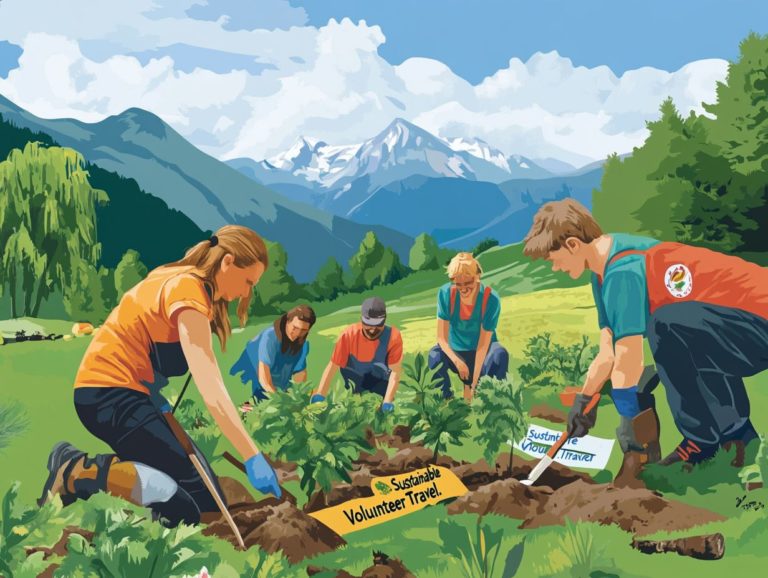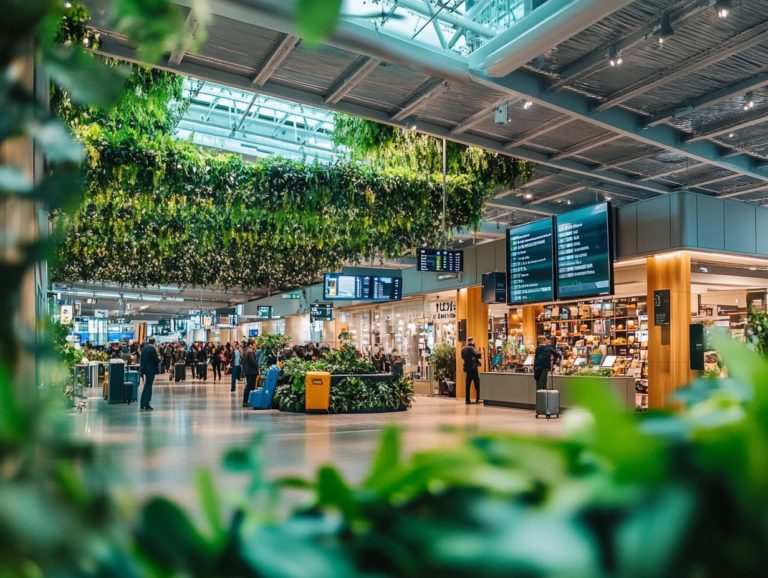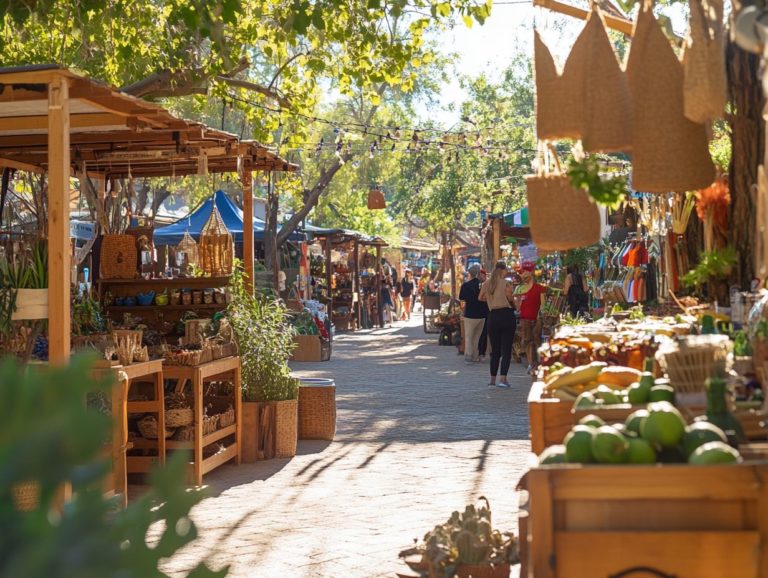10 Eco-Friendly Travel Challenges to Try
Traveling is one of life s greatest delights, but it often comes with a significant environmental cost, leading to various sustainability challenges.
As we become more aware of our ecological impact, eco-friendly travel is becoming fashionable, and many travelers are choosing plastic-free alternatives.
Get ready to explore ten exciting strategies that will help you travel sustainably, including embracing meatless Mondays and mindful shopping.
From selecting sustainable places to stay to supporting local communities and sourcing local food, these insights will enrich your travel experience and contribute to a healthier planet.
Embrace this journey toward responsible travel, which involves promoting green travel and community involvement!
Contents
- Key Takeaways:
- 1. Cut Down Your Carbon Emissions Today!
- 2. Use Public Transportation
- 3. Choose Eco-Friendly Stays
- 4. Pack Light and Use Sustainable Products
- 5. Support Local Businesses and Communities
- 6. Minimize Plastic Usage
- 7. Conserve Water and Energy
- 8. Choose Responsible Tour Operators
- 9. Participate in Volunteering or Conservation Activities
- 10. Offset Your Travel Carbon Emissions
- How Can Eco-Friendly Travel Benefit the Environment and Local Communities?
- What Are the Challenges of Incorporating Eco-Friendly Practices into Travel?
- What Are Some Sustainable Travel Destinations?
- How Can Travelers Educate Themselves About Eco-Friendly Travel?
- What Are the Long-Term Effects of Irresponsible Travel?
- How Can Travelers Encourage Others to Adopt Eco-Friendly Practices?
- Frequently Asked Questions
- 1. What exactly are the 10 Eco-Friendly Travel Challenges to Try?
- 2. How can I participate in these 10 Eco-Friendly Travel Challenges?
- 3. What are the benefits of taking up these challenges?
- 4. Are these challenges suitable for all types of travelers?
- 5. Can I track my progress while completing these challenges?
- 6. Can I continue to follow these eco-friendly practices even after completing the challenges?
Key Takeaways:

- Reduce your carbon emissions by using public transportation and choosing eco-friendly places to stay.
- Support local communities and businesses while minimizing plastic use and practicing mindful water and energy usage.
- Choose responsible tour operators, engage in conservation activities, and plant a tree to offset carbon emissions for a more sustainable travel experience.
1. Cut Down Your Carbon Emissions Today!
Reducing the amount of carbon dioxide your actions produce is essential for promoting sustainability and tackling climate change. It involves making deliberate choices that lessen your daily environmental impact.
By adopting energy-saving practices, like shorter showers and supporting green initiatives, you can significantly lower your emissions and help create a healthier planet.
Simple lifestyle changes, such as using reusable items, shopping mindfully, and sourcing food from local farmers, can lead to a more sustainable future.
Adopting strategies like meal planning or cooking vegetarian recipes can help you make the most of your food and reduce waste, so less goes to landfills. Switching to energy-efficient lighting brightens your home while lowering energy use, which also helps cut utility bills.
Taking public transportation or carpooling can dramatically cut greenhouse gas emissions and promote a more active lifestyle, benefiting your health.
Each of these actions not only focuses on reducing emissions but also fosters a sense of community through local initiatives. They lead to personal health improvements and a shared commitment to caring for the environment.
2. Use Public Transportation
Using public transportation is not only eco-friendly; it s also a smart way to reduce your carbon emissions during your daily commute. By choosing buses, trains, or subways, you lessen your dependence on personal vehicles, leading to lower greenhouse gas emissions and less traffic congestion.
Look at cities like Singapore and San Francisco they have excellent public transportation systems that encourage community involvement and environmental responsibility.
These systems often come with significant cost savings, letting you redirect your resources to other needs, like eco-friendly travel gear. For instance, a monthly transit pass is much cheaper than the costs associated with car ownership, such as maintenance, insurance, and fuel.
Cities like Amsterdam show how well-integrated public transport can strengthen community ties, prompting residents to engage more actively with their surroundings and participate in local food initiatives. Ultimately, these models can serve as blueprints for other cities aiming for a more sustainable future through eco-friendly practices.
3. Choose Eco-Friendly Stays
Choosing eco-friendly accommodations is vital for sustainable tourism. It allows you to reduce your carbon footprint while enjoying a comfortable stay that aligns with your zero-waste goals.
Many hotels and lodges prioritize sustainability by adopting green initiatives, such as energy-efficient lighting, water-saving tactics, and natural cleaning products, including DIY cleaners. These thoughtful choices benefit the environment and elevate your overall travel experience, making it more memorable and fulfilling while supporting local farmers.
By selecting places that champion ecological stewardship, you are part of a larger movement valuing the health of our planet and encouraging community involvement. Numerous establishments proudly hold certifications from organizations like Green Key or the LEED program, a certification for buildings that meet high environmental standards, showcasing their commitment to resource conservation and sustainability.
Many eco-friendly options utilize local materials and support neighboring communities, stimulating the local economy while promoting local food initiatives and reducing transportation emissions. This approach lets you enjoy the stunning beauty of nature while making a difference.
By actively participating in efforts such as composting and recycling, you help protect and preserve these environments for future generations.
4. Pack Light and Use Sustainable Products
Packing light and opting for sustainable products are crucial for eco-conscious travelers like you who want to minimize their environmental impact and adopt a zero-waste lifestyle. Prioritize items such as reusable bags, containers, and natural ingredients, including vegan options, to take a crucial step toward your sustainability goals.
Reducing plastic usage during your journey contributes to environmental conservation and inspires those around you to make more mindful choices.
Choosing eco-friendly travel gear, like biodegradable toiletries and bamboo utensils, significantly eases the strain on landfills while promoting a healthier planet. Incorporating 10 sustainable travel tips for your trip highlights personal responsibility and enriches your travel experience. They can invite creativity in packing, such as meal planning and creating a home garden.
Using compact, multi-purpose items can open up space in your luggage, giving you the flexibility to adapt your travel plans while maintaining environmental responsibility. By making these conscientious adjustments and supporting local businesses, you embody your values and encourage fellow travelers to engage in more sustainable practices.
5. Support Local Businesses and Communities
Supporting local businesses and communities while traveling is an impactful way to foster sustainability and elevate your overall travel experience. Engage in community-supported agriculture programs, dine at local restaurants, and shop at farmers’ markets. You re not just enjoying unique flavors; you re contributing to the local economy and minimizing the carbon footprint associated with food miles.
This mindful decision strengthens community bonds, champions environmental conservation, and fosters a sense of community involvement.
Engaging with local culture through food and community initiatives helps you forge authentic connections that enrich your journey while prioritizing local food sources. Many destinations feature farm-to-table restaurants that collaborate with local farmers, showcasing seasonal produce while keeping their environmental impact in check.
Participating in community-supported agriculture programs allows you to savor the essence of the locale while gaining insights into sustainable farming practices, such as composting and mindful water usage. Innovative business models like cooperatives and local craft markets highlight the importance of preserving regional traditions while ensuring economic resilience.
By integrating these local practices into your travels, such as choosing reusable containers, you enhance your experience and cultivate a deeper appreciation for the places you visit.
6. Minimize Plastic Usage

Minimizing plastic usage is essential for cultivating a sustainable lifestyle. It directly addresses the pressing challenges our planet faces today, such as plastic pollution.
By choosing reusable items like bags, containers, and utensils, you can significantly reduce your reliance on single-use plastics and embrace a zero-waste approach. This transition benefits the environment and enhances your personal health since many eco-friendly products are made with natural ingredients rather than harmful chemicals, aligning with a healthier diet.
Engaging with local recycling programs can further amplify your efforts. Responsible disposal of plastic waste plays a crucial role in mitigating its environmental impact and promoting conservation.
Supporting brands that prioritize sustainability encourages the market to shift toward eco-friendly practices and fosters a sense of environmental responsibility among consumers.
It’s important to recognize that plastic pollution can leach harmful substances into food and waterways, disrupting our hormonal systems and posing serious health risks. These risks can be mitigated through conscientious choices.
Plastic waste has a devastating effect on ecosystems, endangering marine life and terrestrial animals that ingest or get entangled in discarded materials. This highlights the importance of environmental conservation.
Start adopting these exciting strategies today! You’ll play a vital role in contributing to a healthier planet and a more sustainable future.
7. Conserve Water and Energy
Conserving water and energy is essential for fostering sustainability and reducing your environmental footprint. Both resources are critically limited and vital for life, reinforcing the need for water-saving tactics.
By implementing water-saving strategies like opting for shorter showers or switching to energy-efficient lighting you can make a substantial impact on your overall consumption patterns, supporting a plastic-free lifestyle.
This mindful approach conserves precious resources and cuts down on utility costs. It paves the way for a more responsible and eco-conscious lifestyle, allowing for green travel options.
Engaging in local conservation initiatives amplifies your efforts. It promotes community involvement and nurtures a shared responsibility for managing resources.
Innovative technologies, such as smart home systems that optimize energy use or rainwater harvesting systems for irrigation, offer practical solutions to enhance efficiency.
Invite your neighbors to join in these sustainable practices. This can significantly broaden the impact and create a ripple effect that benefits the entire community.
Simple actions, like organizing workshops on sustainability, empower others to embrace eco-friendly habits, ultimately contributing to a healthier planet.
8. Choose Responsible Tour Operators
Choosing responsible tour operators is crucial for promoting sustainable tourism and ensuring your travels have a positive environmental impact. Operators that prioritize eco-friendly practices significantly reduce the carbon footprint associated with your adventures while fostering community involvement and supporting local economies.
By selecting tours that emphasize environmental conservation and respect for local cultures, you can contribute to a more sustainable travel experience.
Such operators typically demonstrate a commitment to minimizing waste, utilizing renewable energy resources, and educating travelers about local ecosystems.
It’s also important to consider their community support initiatives, which might include partnerships with local artisans, contributions to social development projects, or offering fair wages to local guides.
Take, for example, companies like Intrepid Travel and G Adventures. They have established robust sustainability policies that reflect these values and provide authentic experiences that benefit the communities they operate in.
By making informed choices about who to travel with, you can ensure your adventures leave a lasting positive legacy. Join us in these efforts and help create a sustainable future!
9. Participate in Volunteering or Conservation Activities
Participating in volunteering or conservation activities during your travels offers a rewarding opportunity to connect with local communities. You contribute to vital environmental efforts and make meaningful contributions to the ecosystem and community well-being.
From planting trees to joining clean-up initiatives, these experiences create a lasting impact.
Volunteering opens up diverse opportunities. Activities range from wildlife rehabilitation to teaching English in underserved areas.
These activities strengthen the local economy and promote cultural exchange. Engaging in such projects enhances skills like teamwork and problem-solving.
Many initiatives prioritize eco-friendly practices. This approach helps reduce your carbon footprint and promotes conservation in the areas you explore.
10. Offset Your Travel Carbon Emissions
Offsetting your travel carbon emissions empowers you to manage your environmental impact. Support initiatives focused on capturing carbon and renewable energy to foster meaningful change.
Green travel initiatives help you balance your footprint while backing essential conservation efforts.
You can achieve this in various ways. One popular strategy is to donate to reputable environmental organizations.
Participating in tree planting initiatives brings you closer to nature and fosters a sense of stewardship.
Organizations like The Carbon Trust and EcoEnclose offer structured carbon offset programs. This allows you to invest in sustainability with confidence in project monitoring.
These efforts mitigate carbon footprints and empower local communities, enhancing biodiversity.
How Can Eco-Friendly Travel Benefit the Environment and Local Communities?
Eco-friendly travel has many advantages for the environment and local communities. Sustainable tourism prioritizes ecological balance and community welfare.
By choosing travel methods that minimize carbon footprints like using public transportation and enjoying local cuisine you bolster local economies and reduce your environmental impact.
This mindful approach fosters a deeper connection to your destinations, enriching your experience.
Eco-friendly travel also champions resource conservation and respect for local cultures. Staying in eco-lodges often means participating in projects that protect vital wildlife habitats.
Successful initiatives, like community-based tourism in Costa Rica, empower residents. They showcase rich cultural heritage while providing sustainable income.
This model strengthens local economies and educates travelers on preserving natural landscapes and traditions, creating a harmonious win-win scenario for all.
What Are the Challenges of Incorporating Eco-Friendly Practices into Travel?

Incorporating eco-friendly practices into your travels often comes with unique sustainability challenges. You may find yourself navigating the need for awareness and access to resources that support responsible choices.
As you plan your journey, it’s common to encounter limited options for sustainable accommodations. Traditional hotels can overshadow fantastic eco-lodges and accommodations that meet eco-friendly standards that deserve your attention.
When it comes to getting around, public transportation options might not be readily available, especially in remote destinations. This can tempt you to turn to less sustainable means of transport.
Raising awareness about environmental impacts is crucial. Many travelers simply aren’t aware of choices that can help minimize their footprint. To tackle these obstacles, you can take proactive steps by exploring the top 10 most eco-friendly travel destinations that prioritize sustainability.
- Conducting thorough research ahead of time
- Using apps tailored for eco-conscious travelers
- Engaging with local communities to uncover authentic and sustainable options that resonate with your values
What Are Some Sustainable Travel Destinations?
Sustainable travel destinations are gaining recognition for their dedication to eco-friendly practices that minimize environmental impact while celebrating local culture. Places like Costa Rica, New Zealand, and Iceland lead the charge in sustainable tourism.
These locations offer unique experiences that encourage community involvement and environmental conservation. By choosing to visit these destinations, you can revel in breathtaking landscapes while contributing to the preservation of our planet.
Take Costa Rica, for example. Many incredible eco-lodges harness the power of the sun for energy and employ water conservation techniques. This allows you to immerse yourself in nature without leaving a heavy footprint.
In New Zealand, initiatives prioritize Maori culture and conservation. This ensures you respect and appreciate the land’s rich heritage as you explore.
Meanwhile, Iceland demonstrates how to balance tourism and ecological integrity by utilizing renewable energy sources and protecting its delicate ecosystems. Together, these destinations promise unforgettable adventures and actively engage you in the pursuit of a more sustainable way to experience the world.
How Can Travelers Educate Themselves About Eco-Friendly Travel?
Educating yourself about eco-friendly travel is crucial for making informed choices that align with your sustainability goals and help reduce your carbon footprint. You can tap into a wealth of resources, such as online guides, workshops, and community initiatives.
These resources provide valuable insights into responsible travel practices and the environmental impact of your decisions. By staying informed, you can become an advocate for sustainable tourism and positively contribute to the communities you visit.
One practical approach is to engage with travel blogs that focus on green tourism. They often share firsthand experiences and tips from fellow eco-conscious travelers.
Participating in webinars hosted by environmental organizations can deepen your understanding of current issues and sustainable practices shaping travel today. Join local projects, like beach cleanups, to help the environment and connect with locals.
This ongoing journey of learning transforms you into a more responsible traveler one who respects and nurtures the destinations explored. Start your journey today to make a difference tomorrow!
What Are the Long-Term Effects of Irresponsible Travel?
The long-term effects of irresponsible travel can seriously harm the environment and local communities. This highlights the urgent need for sustainable tourism practices.
For example, in Bali, unchecked tourism has led to significant coral reef destruction and pollution of marine habitats. As tourists flood the island, local fishermen face challenges in maintaining their traditional practices and are threatened by declining fish populations, jeopardizing their livelihoods.
In many historical cities, mass tourism erodes cultural authenticity, reducing rich traditions to mere performances for visitors. These narratives reveal the immediate consequences of irresponsible travel and the profound changes that can uproot communities. Therefore, travelers must adopt sustainable practices to preserve our world’s beauty and diversity for future generations.
How Can Travelers Encourage Others to Adopt Eco-Friendly Practices?
Travelers play a pivotal role in encouraging others to embrace eco-friendly practices through their unique experiences and insights into sustainable tourism. By engaging with communities and advocating for responsible travel habits, you can inspire those around you to make conscious choices that benefit both the environment and local economies.
You can amplify this influence by using social media platforms to share compelling stories and stunning images that showcase eco-friendly initiatives. Participating in local programs that protect natural resources or educating fellow travelers about minimizing their carbon footprint demonstrates that every choice truly matters. Additionally, adopting top sustainable travel practices can further enhance your positive impact.
Advocating for sustainable practices in conversations with local residents and other tourists fosters a sense of responsibility. Each interaction serves as a powerful reminder that the journey toward sustainability is a collective effort, and your contributions are essential in shaping that journey.
Frequently Asked Questions
1. What exactly are the 10 Eco-Friendly Travel Challenges to Try?

The 10 Eco-Friendly Travel Challenges help you travel smarter. They include fun actions like:
- Reducing plastic usage
- Supporting local communities
- Minimizing your carbon footprint
2. How can I participate in these 10 Eco-Friendly Travel Challenges?
You can participate by first familiarizing yourself with the list of challenges and then incorporating them into your travel plans. Challenge your friends and family to join in and make it a group effort for a positive environmental impact!
3. What are the benefits of taking up these challenges?
By participating, you contribute to a more sustainable and greener travel industry. You’ll also learn and practice new eco-friendly habits that you can continue in your daily life even after your trip.
4. Are these challenges suitable for all types of travelers?
Absolutely! These challenges suit all types of travelers from solo backpackers to families with kids. They are flexible and can be adapted to different travel styles and preferences. It s all about making small changes and being mindful of our environmental impact.
5. Can I track my progress while completing these challenges?
Yes! You can track your progress using a travel journal or a sustainability app. Many of these challenges involve keeping track of your eco-friendly actions, such as the number of plastic items you’ve refused or the amount of carbon emissions you’ve offset.
Start your eco-friendly journey today. Every choice matters!
6. Can I continue to follow these eco-friendly practices even after completing the challenges?
Absolutely! The goal of these challenges is to encourage long-term eco-friendly habits in our daily lives.
After finishing the 10 Eco-Friendly Travel Challenges, we hope you ll continue making thoughtful and green choices on your future trips. Keep up the great work and make a positive impact every time you travel!






